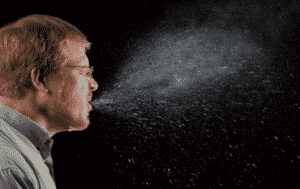
Here are a couple of essential virology basics from Dr. Tenim’s class.
- There are a lot of viruses!
- We are mostly microbes. Viruses, bacteria, fungi and protozoa live in and on our body that far outnumber our human cells. When in balance, our microbial selves are essential for our health and well-being.
- Often, viruses do not make us sick.
- Most virus infections don’t cause any symptoms because our body responds quickly to neutralize the virus.
- Sometimes, viruses do makes us sick.
- You can get sick if you are exposed to a large amount of the virus. There is a lot packed into a single droplet, so just imagine the dose of virus in a sneeze!
- People can get sick when viruses jump from animals to humans.
- Underlying health conditions may make people more susceptible to disease from virus infections.
- Genetic vulnerability can make people more susceptible to disease from virus infections.
COVID-19 is a coronavirus – a large family of viruses that cause a range of respiratory infections. While the epidemiology of the virus continues to unfold, it appears that COVID-19 is following Virology 101 rules with most infections not causing disease. But we all know that ME/CFS and FM don’t play by the rules and the immune dysfunction that underpins these diseases mean that patients may be at increased risk of severe infection if exposed to COVID-19. While we wait for the development of antivirals and a vaccine, ME/CFS and FM patients should be prepared and minimize your exposure. Click here to watch a 2-part video message from Linda Milne, Emergency Preparedness Specialist to help you prepare and minimize your exposure.
If you do feel sick with a fever, cough or difficulty breathing, contact your healthcare provider who will work with your state’s public health department.
I also recommend watching this video of Infectious Disease Specialist, Dr. Ian Lipkin further explain how coronavirus spreads.
We thank you for your continued support as we press forward in our vision to create a world where patients with ME/CFS and FM are readily diagnoses, effectively treated, and widely met with empathy and understanding.
Please consider making a donation to BHC, a 501 (c)3 nonprofit organization, today.


 Lucinda Bateman, MD, is a renowned clinician, researcher, and educator. Her Johns Hopkins University Medical School training instilled an approach to care that she has employed throughout her career - the patient comes first and the unknown or unexplained does not equate to a lack of proper and compassionate care. Since starting her own practice in 2000, she has served on six boards or committees, been the principal investigator for 45 studies, authored/coauthored 40 journal articles, served as adjunct instructor and adjunct assistant professor in the University of Utah Departments of Preventative Medicine, Internal Medicine, and Anesthesiology, and lectured around the world.
Lucinda Bateman, MD, is a renowned clinician, researcher, and educator. Her Johns Hopkins University Medical School training instilled an approach to care that she has employed throughout her career - the patient comes first and the unknown or unexplained does not equate to a lack of proper and compassionate care. Since starting her own practice in 2000, she has served on six boards or committees, been the principal investigator for 45 studies, authored/coauthored 40 journal articles, served as adjunct instructor and adjunct assistant professor in the University of Utah Departments of Preventative Medicine, Internal Medicine, and Anesthesiology, and lectured around the world.